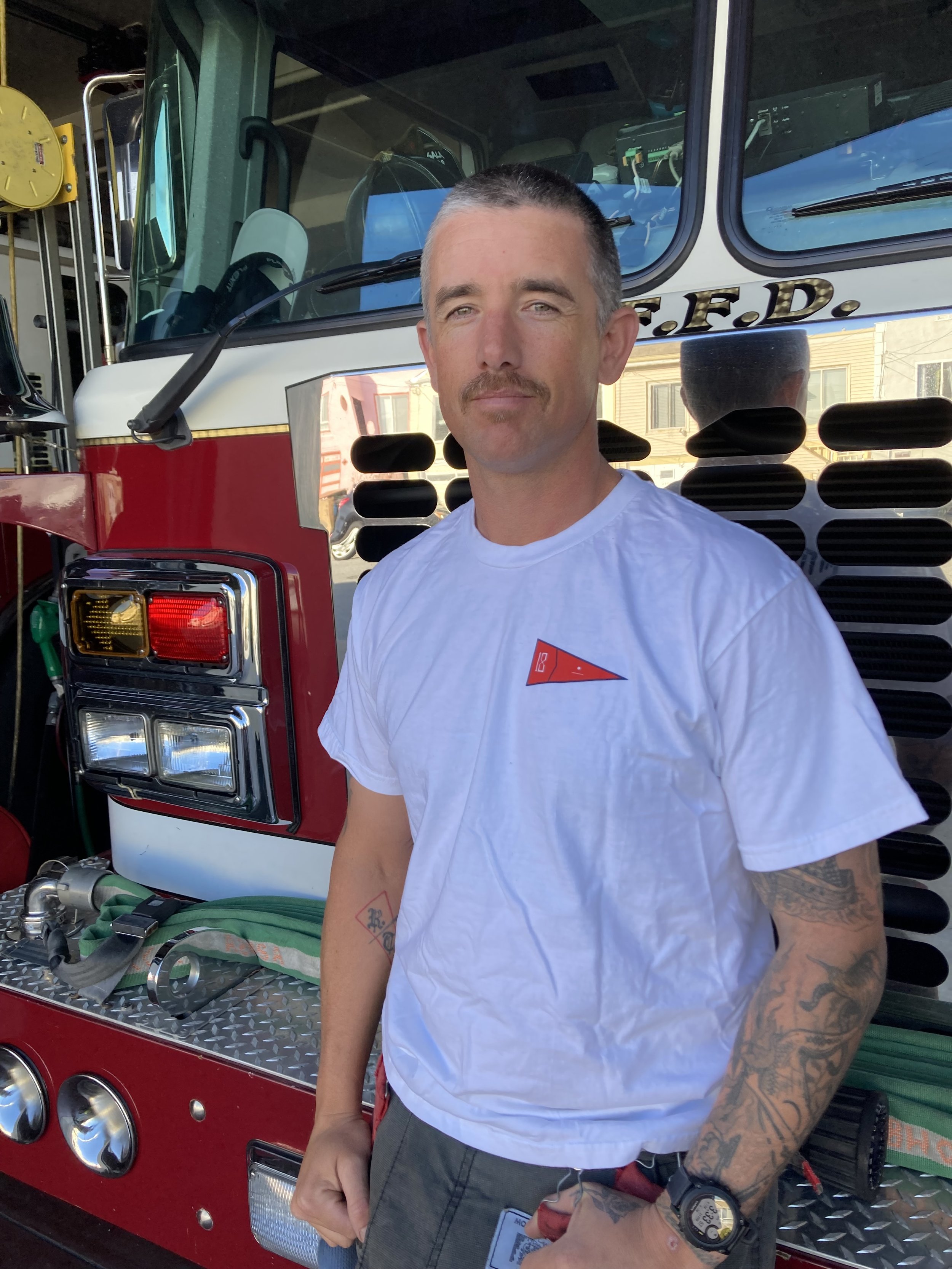Firefighter Profile: Competitive Surfer Travis Payne Saves Lives in Fire and Water
Sunset firefighter and surfer Travis Payne.
For firefighter Travis Payne, a love of surfing became an essential job description. As an internationally known big-wave competitive surfer who placed second at the Mavericks contest, he brings those skills to saving lives.
Payne’s firehouse is known as a “surf house” because it serves Sunset neighborhoods near the ocean.
Payne will race into the waves with his surfboard to reach an injured or struggling swimmer. Then he will travel with the victim in the ambulance to help administer medical aid.
“I’ve ended up at the hospital in my wetsuit,” says Payne, 38, a firefighter-paramedic and a member of the Station 18 surf-rescue team. “If they’re in critical condition, there’s usually a lot of work to be done on the way to the hospital.”
Payne describes himself as “pretty chill” and says the laid-back surfer persona helps in his paramedic work.
“Working on ambulances for so many years, I learned how to react under pressure,” he says. “If you can stay calm, that usually calms the other person down.”
Most days, Payne’s work as a firefighter-medic on dry land in the Sunset: fires and medical calls.
But some days, like on February 9, are like no other. An explosion was heard for miles.
That sunny morning, Travis Payne was helping his station crew swab the fire engine. They first thought the boom might be fireworks. Moments later they got the call – a huge explosion and fire at 22nd Avenue and Noriega Street.
Station 18 was the third company on the scene. “We could see smoke and a huge fireball as we were coming up Noriega,” Payne says. “The house was fully engaged in fire.”
Station 18 helped lay hose and deploy a line to the burning house.
As 100 firefighters and 50 pieces of apparatus were fighting the fire, “the whole second floor collapsed and shot a fireball out into the front of the house,” Payne recalls.
At one point, a power line snapped off and swung down dangerously near four firefighters. “It was a very dynamic scene,” Payne recalls.
Investigators later blamed the explosion on a drug lab in the house, which was destroyed by the blaze. Two adjacent houses were heavily damaged. A man who lived at the house was charged in the explosion; his wife died in the fire and her caregiver was severely injured. At least one firefighter was injured.
As a firefighter-paramedic Payne battles his share of blazes, but when the call is for an injury or medical emergency, his primary role is as a paramedic, licensed to provide advanced life support. EMTs, by comparison, provide basic life support. Prior to joining the fire department, he spent 12 years on ambulance crews.
“We have a lot of surf accidents out here, which can be very challenging,” Payne says.
Virtually all occur in summer, when waves are relatively gentle, but the rip currents can be lethal. “People from out of town don’t know that,” Payne says, “and we’re often rescuing people wearing jeans and tee shirts.”
Fire is a constant threat in the Sunset, in part because many of the homes are older and don’t have sprinklers like downtown highrises. Most Sunset homes are attached or very close to each other, which poses the danger of fires jumping from house to house. That’s why the Fire Department plays it safe and responds to residential fires with multiple pieces of equipment, Payne explains.
Payne also notes that many Sunset fires have been caused by lithium-ion batteries on electric scooters and skateboards that overheat while they are charging. “For me, if I’m not going to be home, I turn off all my appliances – washer, dryer, dishwasher. And I never charge anything indoors.”
Payne comes from a long line of surfers and firefighters. He was raised in Pacifica, and both his parents surfed. His wife has surfed too – “but she hates cold water,” Payne says. Family firefighters included his dad, uncle, and grandfather.
Payne loves firefighting for many reasons, including the camaraderie at Station 18 and the flexibility to choose a career niche and stick with it.
”You can choose your path – get a dog and go into urban search and rescue; or fire prevention, arson, building inspection. You can go downtown and handle 27 calls a day. Everybody comes to the Fire Department from different paths.”
For Payne, his path is through the water.
“I’m really comfortable being near the ocean and being part of the surf rescue team,” Payne says. “I couldn’t see myself doing anything else.”
Reported and written by volunteer community journalist Tom Colin. We encourage retired journalists and student journalists in high school and college to volunteer as writers for Supervisor Engardio’s newsletter. Interested? Apply here. Do you know a story you would like to see featured in the newsletter? Tell us about it here.

